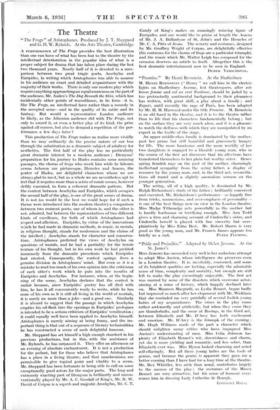"Promise." By Henri Bernstein. At the Shaftesbury M. HENRI BERNSTEIN
(" Henry " we call him in the electric lights on Shaftesbury Avenue, lest theatregoers, after sole -bonne femme and vol an cent Toulouse, should be jaded by a too protractedly continental background to their pleasures) has written, with great Skill, a play about a family; and -Espoir, until recently the rage of Paris, has been adapted by'Mr. H. M. HarwoOd under the title Pmmise. M. Bernstein is an old hand in the theatre, and it is do the theatre rather than to life that his characters fundamentally belong ; but on the surface they are very much alive, and it is a pleasure to watch the deftness with which they arc manipulated by an expert in the traffic of the stage.
An upper middle-class family is dominated by the mother. past her prime but still beautiful and gruesomely hungry for- life. The more handsome and the more worldly of her two daughters is engaged to a likeable young man, who in the course of the first act discovers that his affections have transferred themselves to her plain but worthy sister. Hence spring fiendish rage on the part of the mother, charmingly ineffectual sympathy from the aging father, a display of resource by the young inani and, in the third act, reconcilia- tions all round and a slightly anomalous sermon -on the younger generation.
The acting, all of a high quality, is dominated by Mr. Ralph Richardson's study of the father ; brilliantly conceived and executed, Mr. Richardson's performance—so happily free from tricks, mannerisms, and over-emphasis of personality— is one of the best things now on view in the London theatre. Miss Madge Titheradge acts powerfully as the mother but is hardly loathsome or terrifying enough. Miss Ann Todd gives a firm and charming account of Cinderella's sister, and Cinderella herself is played with fine sincerity but over- plaintively by Miss Edna Best.. Mr. Robert Harris is very good as the young man, and Mr. Francis James appears too
















































 Previous page
Previous page